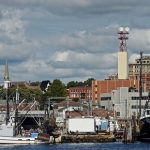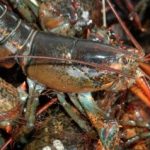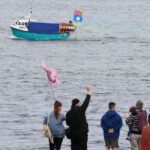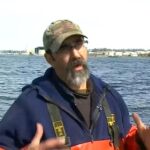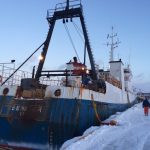Tag Archives: Biden Administration
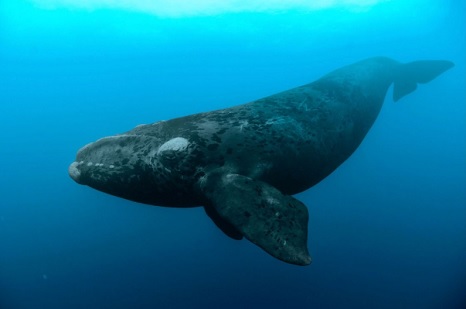
Biden Administration Is Killing Whales and Covering it Up
The Biden Administration is rushing headlong to start the massive construction of offshore wind power projects off the East Coast. The wind industry calls these installations “farms.” In no way, shape, or form do they resemble bucolic farms. Fortunately, several citizen groups have been formed which are vigorously opposing this massive industrialization of the ocean. The two leading organizations are Save Right Whales Coalition, lead by Lisa Linowes, and Save Long Beach Island, lead by Dr. Robert Stern. In addition, Michael Shellenberger has produced a terrific documentary, Thrown to the Wind, which provides an eye-opening view into the real world of noise produced by so called survey ships. Save LBI has also initiated litigation in New Jersey federal court seeking to revoke the permits issued by the Bureau of Ocean Energy Management (BOEM) authorizing this pre-construction activity. By Collister Johnson. >>click to read<< 09:26
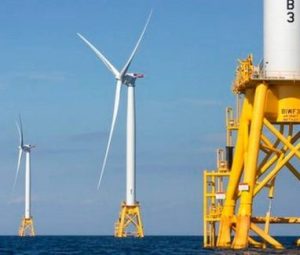
President Biden’s Offshore Wind Policies Make National Lobster Day a Day to Mourn
National Lobster Day was established by Congress to celebrate the tasty crustacean’s place in American history, culture, and commerce. Sadly, due to President Biden’s offshore wind policies, and his agencies’ blame shifting, it may soon become a day to memorialize the passing of a great industry, tradition, and a tasty meal. On December 1, President Joe Biden hosted a state dinner with French President Emmanuel Macron, at which more than 200 Maine lobsters were served. The dinner was rife with hypocrisy since earlier in his administration, Biden’s National Marine Fisheries Service, an office in the National Atmospheric and Oceanic Administration (NOAA), issued new restrictions on Maine’s lobster fishers to protect North American right whales from entanglement with lobster fishing gear. >>click to read<< 10:40

RI fishermen’s board resigns en masse over Biden admin-backed offshore wind farm: ‘Wholesale ocean destruction’
A plan backed by the Biden administration to OK a string of wind farms off Rhode Island has prompted every member of a fishing regulatory board in the state to resign. The entire Rhode Island Fisherman’s Advisory Board quit en masse Friday to protest the 84-turbine Sunrise Wind project after the state’s Coastal Resources Management Council approved the third offshore wind farm in two years off the Ocean State’s waters. The project falls under President Biden‘s executive order authorizing his Interior Department to double US offshore wind capacity by 2030. With the project’s approval, the Bureau of Ocean Energy Management is on track to finish reviews for 16 wind farms by 2025. But foes including the fishing board say the Sunrise plan ignores environmental regulations and anglers’ concerns Video, >>click to read<< 17:54
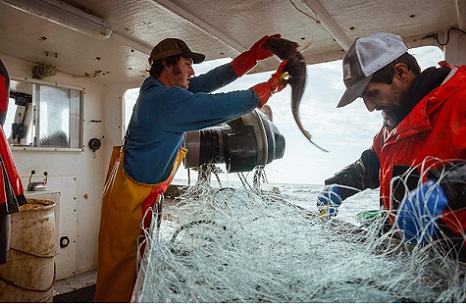
Experts fear American fishing industry, boating at risk as Biden prioritizes climate, green energy
The Biden administration has prioritized green energy at the expense of endangered whales and the U.S. fishing industry with regulation that limits both commercial fishing and recreational boating, according to experts. As they are imposing more regulations, they are also promoting offshore wind, which is actually harming commercial and recreational boating and potentially killing whales, Brady and Lapp said. “They positioned us as being these evildoers and now, 20 years later, whales are dropping dead like pigeons in Manhattan,” Brady said. “Here commercial fishermen and coastal communities are at the front line of fighting to protect the ocean itself, and we have crickets from virtually every NGO.” Video, >>click to read<< 09:09
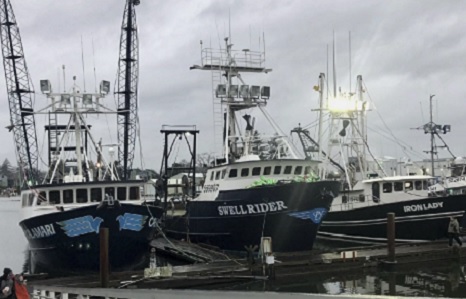
‘They’re not listening’: Fishermen, tribes voice concerns on two Oregon coast sites eyed for offshore wind farms
Last week, the Federal Bureau of Ocean Energy Management (BOEM) announced two draft Wind Energy Areas off the southern Oregon coast. One of them is offshore of Brookings, near the California border, the other off the coast of Coos Bay. The areas also represent prime fishing grounds and important cultural areas to local Indigenous tribes. Heather Mann, executive director of the Newport-based Midwater Trawlers Cooperative, said it feels like a lot of stakeholders’ concerns are being left unheard. “They’re not listening to coastal communities. They’re not listening to the fishing industry. They’re not listening to congressional representatives,” said Mann, whose organization represents 32 vessels that fish in the area. “Fishermen are not just concerned about being displaced from fishing grounds, though that is a critical piece. ” Video, >click to read< 11:35
Cancelation of California salmon season forces fishermen to find new way forward
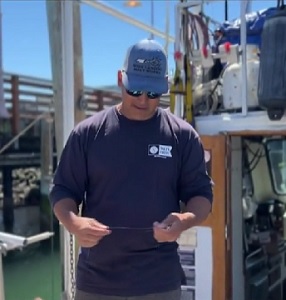 Salmon fishers across the state are pivoting to stay afloat after the salmon fishing season was canceled earlier this year. At dock 47 in San Francisco, the pier looks different this time of year. More boats are tied up, an unusual sight for what would be peak salmon season. Matt Juanes is preparing to head out to sea. He readies his lines and hopes for a big catch. For now, it’s all he can do. “My goal is to catch every last one of them,” he said aboard his boat Plumeria. But this year, the salmon fisher of 8 years is exploring uncharted territory for him. He’s now looking to catch shrimp and halibut after salmon season was canceled for repopulation efforts. Video, >click to read< 09:03
Salmon fishers across the state are pivoting to stay afloat after the salmon fishing season was canceled earlier this year. At dock 47 in San Francisco, the pier looks different this time of year. More boats are tied up, an unusual sight for what would be peak salmon season. Matt Juanes is preparing to head out to sea. He readies his lines and hopes for a big catch. For now, it’s all he can do. “My goal is to catch every last one of them,” he said aboard his boat Plumeria. But this year, the salmon fisher of 8 years is exploring uncharted territory for him. He’s now looking to catch shrimp and halibut after salmon season was canceled for repopulation efforts. Video, >click to read< 09:03
Opinion: Breach the Snake River dams? Only if you want more carbon and more expensive power
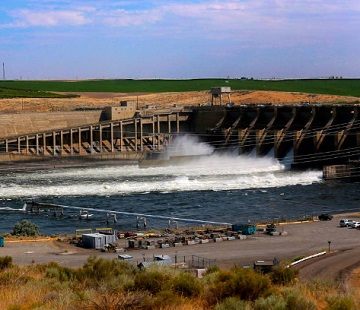 Recently our local papers have been publishing opinion pieces suggesting the possibility or necessity of removing the four lower Snake River dams to protect Idaho salmon runs. And earlier this year the Idaho Press published an article reporting that the Biden administration has released two reports stating that removal of the four dams on the lower Snake River “may be needed to restore salmon runs to sustainable levels.” There are other much cheaper alternatives that may be just as effective in preserving the salmon runs — maybe more. One would be to permanently remove the sea lions that congregate at the base of Bonneville Dam, the first dam on the Columbia River. Those sea lions decimate thousands of migrating salmon that gather around the base of the dam as they try to find the fish ladder over the dam. >click to read< 11:27
Recently our local papers have been publishing opinion pieces suggesting the possibility or necessity of removing the four lower Snake River dams to protect Idaho salmon runs. And earlier this year the Idaho Press published an article reporting that the Biden administration has released two reports stating that removal of the four dams on the lower Snake River “may be needed to restore salmon runs to sustainable levels.” There are other much cheaper alternatives that may be just as effective in preserving the salmon runs — maybe more. One would be to permanently remove the sea lions that congregate at the base of Bonneville Dam, the first dam on the Columbia River. Those sea lions decimate thousands of migrating salmon that gather around the base of the dam as they try to find the fish ladder over the dam. >click to read< 11:27
Federal grants will replace tunnels under roads that allow water to pass through but not fish
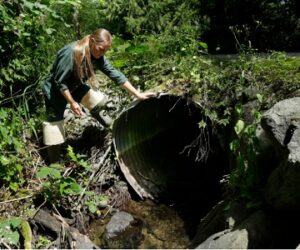 The Biden administration announced nearly $200 million in federal infrastructure grants on Wednesday to upgrade tunnels that route streams under roads but can kill fish that get trapped trying to get through. “We inherited a lot of structures that were built in a way that just didn’t think through the effect they had on fish,” US Secretary of Transportation Pete Buttigieg said in an interview with The Associated Press. “You don’t have to be a fish lover or an ecologist to care about this. It is very important for livelihoods, the economy and the way of life in many parts of the country.” Some of the 169 projects included in the first batch in a $1 billion initiative to be rolled out over five years under the Infrastructure Investment and Jobs Act of 2021 would upgrade or replace the culverts with bridges to make water — and fish — more free to let flow. >click to read< 11:36
The Biden administration announced nearly $200 million in federal infrastructure grants on Wednesday to upgrade tunnels that route streams under roads but can kill fish that get trapped trying to get through. “We inherited a lot of structures that were built in a way that just didn’t think through the effect they had on fish,” US Secretary of Transportation Pete Buttigieg said in an interview with The Associated Press. “You don’t have to be a fish lover or an ecologist to care about this. It is very important for livelihoods, the economy and the way of life in many parts of the country.” Some of the 169 projects included in the first batch in a $1 billion initiative to be rolled out over five years under the Infrastructure Investment and Jobs Act of 2021 would upgrade or replace the culverts with bridges to make water — and fish — more free to let flow. >click to read< 11:36
Fishermen slam Biden admin’s offshore wind push as threat to jobs, sea life
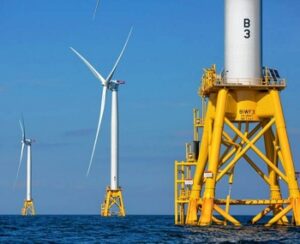 The New England Fishermen’s Stewardship Association (NEFSA) on Monday released an Offshore Wind Research Summary, a compilation of scholarly articles that identify dangers offshore wind farms pose to ocean ecosystems. “We cannot industrialize the Gulf of Maine until we understand how the wind industry interacts with the fisheries that wild harvesters have stewarded responsibly for decades,” said Jerry Leeman, NEFSA CEO and a longtime commercial fishing captain. Leeman says that the government’s attempt to justify wind farms leans on “voodoo science” because the proper methods and sufficient amount of time have not been applied. “The problem is the science that wraps around the science, the whole purpose for it is misinterpreted to the public through the fact that they think they’re getting real, accurate science,” Leeman said. >click to read<
The New England Fishermen’s Stewardship Association (NEFSA) on Monday released an Offshore Wind Research Summary, a compilation of scholarly articles that identify dangers offshore wind farms pose to ocean ecosystems. “We cannot industrialize the Gulf of Maine until we understand how the wind industry interacts with the fisheries that wild harvesters have stewarded responsibly for decades,” said Jerry Leeman, NEFSA CEO and a longtime commercial fishing captain. Leeman says that the government’s attempt to justify wind farms leans on “voodoo science” because the proper methods and sufficient amount of time have not been applied. “The problem is the science that wraps around the science, the whole purpose for it is misinterpreted to the public through the fact that they think they’re getting real, accurate science,” Leeman said. >click to read<
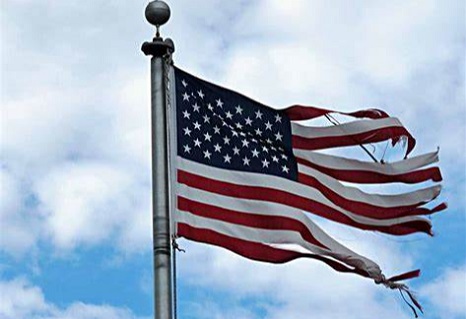
OFFSHORE WIND OPPONENTS NEED A MASS PROTEST IN WASHINGTON DC – BY JIM LOVGREN
In 2010 and 2012 fishermen held two different successful protests in Washington DC with thousands of fishermen travelling from around the country to attend. Both commercial and recreational fishermen voiced their concerns regarding catch shares and Magnuson Act reauthorization, among the multitude of issues that threatened their livelihoods. Today, the fishing industry is facing a far worse enemy then fishery management, as thousands of square miles of their historic fishing grounds have been auctioned off to the highest bidder in order to make way for the wildlife killing machines called wind turbines. These auctions have been held by BOEM, the Bureau of Ocean Energy Management, a part of the Department of the Interior. They are charged with the selling or leasing of US natural resources in our offshore waters, and apparently, they have absolutely no regard for any wildlife that may exist within them, or any people who might derive a living from catching said wildlife. >click to read< 11:50
Fishermen, activists protesting offshore wind projects on the East Coast
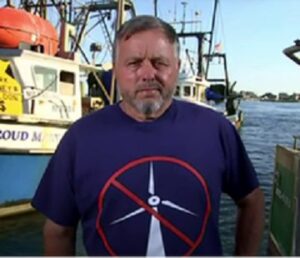 Critics are sounding the alarm on the ecological consequences of the Biden administration’s green energy agenda, specifically the increase marine wildlife deaths in conjunction with offshore wind farms. Activists along with local fishermen are particularly concerned about the rise in whale and dolphin beaching. “What we’re seeing is a failure to properly manage the situation,” Rhode Island fisherman Chris Brown said. “The whales have been migrating from their southern stations during the spring up through the mid-Atlantic region, and they didn’t even slow down the acoustic carpet bombing. And as a result, the Atlantic was littered with the dead whales and dolphins and sharks. There doesn’t seem to be any environmental concern. This is a manmade environmental disaster that’s unfolding. I expect that it will half a whale population in 10 years and probably the same for our fish.”Video, photos, >click to read< 19:17
Critics are sounding the alarm on the ecological consequences of the Biden administration’s green energy agenda, specifically the increase marine wildlife deaths in conjunction with offshore wind farms. Activists along with local fishermen are particularly concerned about the rise in whale and dolphin beaching. “What we’re seeing is a failure to properly manage the situation,” Rhode Island fisherman Chris Brown said. “The whales have been migrating from their southern stations during the spring up through the mid-Atlantic region, and they didn’t even slow down the acoustic carpet bombing. And as a result, the Atlantic was littered with the dead whales and dolphins and sharks. There doesn’t seem to be any environmental concern. This is a manmade environmental disaster that’s unfolding. I expect that it will half a whale population in 10 years and probably the same for our fish.”Video, photos, >click to read< 19:17
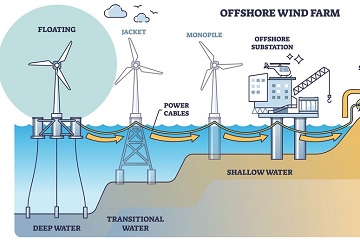
Humboldt Bay – Port of Entry
Big changes are afoot on the Samoa Peninsula. The Humboldt Bay Harbor, Recreation and Conservation District is planning to construct a large manufacturing center to craft and assemble giant wind turbines suitable for the deep offshore waters of the Pacific Coast. Officially known as the Humboldt Bay Offshore Wind Heavy Lift Multipurpose Marine Terminal Project, the port development is a crucial step to bring plans to build a first-of-its kind wind farm off the Pacific Coast to fruition. It would also position Humboldt’s as the only port on the West Coast built to manufacture and repair the turbines — a potential economic boon for the area as the industry enters a period of unprecedented growth. In an effort to address the climate crisis, the Biden administration issued an executive order about a year ago requiring 30 gigawatts of energy to be produced by offshore winds by 2030. >click to read< 10:04

NOAA’s Sanctuary Expansion Proposal: ‘The nail in the coffin’ of American Samoa’s tuna industry
A regional fishery council warned that the Biden administration’s plan to block off the U.S territorial waters in the Pacific would be the end of American Samoa’s tuna canning industry and quash the culture which the federal government claims to protect. While commercial fishing is currently allowed within 50 to 200 miles of the Pacific Remote Islands Marine National Monument, the National Oceanic Atmospheric Agency’ssanctuary expansion proposal would completely cover the U.S exclusive economic zone, prohibiting commercial fishing by U.S fishermen in U.S waters. “For more than 30 years, American Samoa-based purse seiners and Honolulu-based longliners operated in the waters of the Pacific Remote Islands Area until the establishment of the PRIMNM in 2006,” the Western Pacific Fishery Management Council said. “This new action will force U.S purse seiners to fish farther away from Pago Pago Harbor and transport their catch to Mexico and Ecuador instead of the StarKist Samoa cannery, which serves as the backbone of American Samoa’s economy,” the council added.>click to read< 15:45
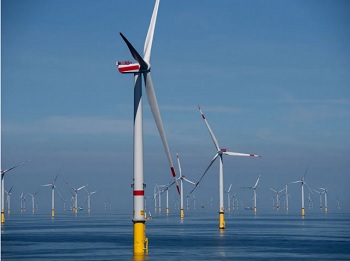
The dirty details of offshore wind’s ‘clean energy’
“In New Jersey, it’s go hard or go home,” Gov. Phil Murphy Tweeted after signing an executive order to up the state’s offshore wind goals by nearly 50% last September. Perhaps, the governor didn’t consider the fact that those in the state who question the perils and efficacy of offshore wind turbines are playing by the same saying. This “clean energy economy,” as conceived and fast-tracked by the Biden administration (and treated as the holy grail by Gov. Phil Murphy), has been shoved down the throats of those who live in shore communities, even though the risks to every aspect of marine life are poorly understood and little evidence exists that wind energy will make a noteworthy impact on climate change. By Linda Bonvie, >click to read< 09:53
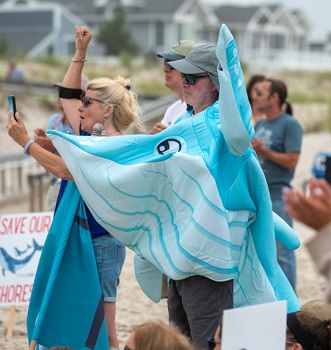
Save Our Shores Rally Beachgoers to Offshore Wind Fight
A day at the beach took on a different meaning Saturday as offshore wind opposition groups came together to educate the public about the impact of wind energy on Jersey Shore communities during a “Save Our Shores” event on the 68th Street beach in Long Beach Township. A short distance from where groups like Save LBI, Clean Ocean Action, Defend Brigantine, and Save the East Coast set up, Jon Shields and Emily Fiore, both of Surf City, put a familiar Save LBI sign in the sand and stood behind it. Shields said he comes from an engineering background, learned about wind turbines and what to do when they are built in school and that’s where his concerns stem. Lots of photos! >click to read< 11:09
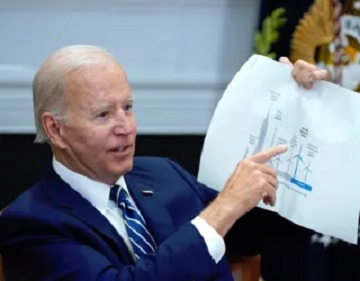
Biden admin under fire for offshore wind impacts on military operations
Earlier this week, Rep. Chris Smith, R-N.J., industry stakeholders and experts met with officials from the Government Accountability Office (GAO), a top federal watchdog agency, to discuss their concerns about offshore wind development. According to Smith, who represents a district along the Atlantic coast home to a naval weapons depot and where offshore wind projects have been proposed, more than an hour of the three-hour meeting was devoted to military impacts. The GAO recently agreed to investigate the wide-ranging effects of offshore wind development after Smith, fellow New Jersey Rep. Jeff Van Drew, House Natural Resources Committee Chairman Bruce Westerman, R-Ark., and several other lawmakers called for a probe. The investigation will look, in part, into wind turbines’ impact on military operations and radar. >click to read< 07:55

Seafood legislation would ban import of Russian-origin seafood products
Legislation introduced in the U.S. House and Senate this week would impose a ban on the import of all Russian-origin seafood products still making their way into the United States. An executive order signed in March of 2022 by President Biden prohibited the import of unaltered seafood originating in Russia. That order did not, however, block Russian seafood that has been substantially changed through reprocessing in another country. The U.S.-Russian Federation Seafood Reciprocity Act of 2023 was introduced by Sens. Lisa Murkowski and Dan Sullivan, both R-Alaska. Companion legislation was introduced in the House by Reps. Mary Sattler Peltola, D-Alaska, and Garret Graves, R-LA. >click to read< 10:20

Fishermen File Lawsuit Against Biden Administration, Claiming Regulations are Threatening Their Business
Two fishermen have filed a lawsuit against the Biden administration, claiming that Congress and unelected councils are unconstitutionally regulating and overseeing fisheries. Commercial fishermen George Arnesen of Louisiana and Ryan Bradley of Mississippi argue that the regulatory authority has been placed in the hands of an “unconstitutional regime” that is detrimental to local fishermen. They claim that these regulations make them “vulnerable to capture by narrow private interests.”The lawsuit specifically cites the 1976 Magnuson-Stevens Fishery Conservation and Management Act as the primary law governing marine fisheries management in U.S. federal waters. The plaintiffs argue that Congress has converted federal waters into “Constitution-free zones,” in violation of the Constitution. >click to read< 09:52
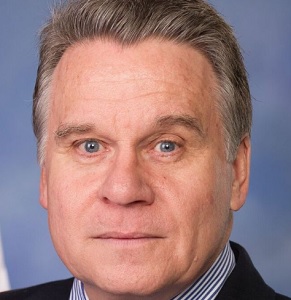
GAO to investigate New Jersey ‘offshore wind industrialisation’
The Government Accountability Office (GAO), an independent congressional watchdog, has agreed to launch an investigation into the impact of the development of windfarms offshore New JerseyThe investigation will examine the potential effects of the development of offshore wind on the environment, fishing industry, military operations, navigational safety and other issues, said Representative Chris Smith (R-NJ). Representative Smith said the GAO would conduct an “aggressive, independent investigation” into what he claimed are the “ocean-altering impacts of the 3,400 offshore wind turbines slated for the Jersey shore” and “address concerns” that, he claimed, “the Biden Administration and Governor Murphy continue to dismiss. >click to read< 07:44
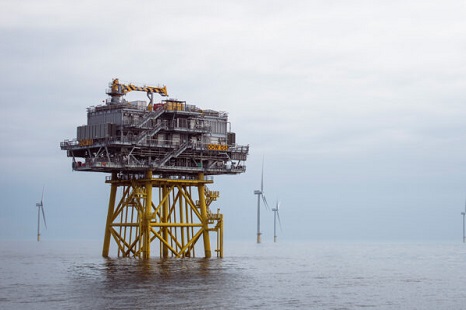
Offshore Wind Electrical Substations; The Secret, Silent Killers by Jim Lovgren
The marine mammal strandings that are taking place almost everyday along the US east coast are the most visible consequence of the Biden administration’s reckless disregard of all environmental safeguards that had been carefully crafted since the environmental movement started in the 1960’s. Embarrassingly, the cowards at the National Marine Fishery Service have stood by and watched as research vessels have been performing geologic surveys with high powered Sonar, and Seismic devises before they had their incidental take permits issued. They have also authorized over 100,000 level B takes of marine mammals, and that’s just for a few projects, as they fully expect the offshore wind factories to cause the extinction of the critically endangered Northern Right Whale. Just ask Sean Hayes, from the NMFS protected species department, whose observations were ignored by BOEM, hence an ESA violation. >click to read< 11:34
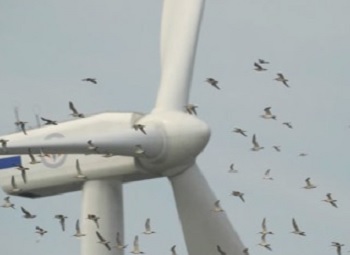
Global Wind Day, Environmental Nightmare
June 15 was Global Wind Day. Its European industry sponsors hope to promote the “power and possibilities” of wind turbines. But beware the Ides of June. Wind turbines have been sold to us as a means of reducing emissions, global warming and climate change. Although there are a lot of wind turbines installed around the world with many more seemingly to come, they have not reduced emissions, warming or climate change. And they offer no chance to do so, even if those things were desirable. Coming eight days short of the 35th anniversary of James Hansen’s Senate testimony that sent the world into global warming panic, it’s clear to anyone who cares to look that emissions have nothing to do with recent warming. >click to read< 08:55

Government Watchdog Agrees to Probe Effects of Offshore Wind Turbines
Following a request from a group of Republican congressmen, the Government Accountability Office (GAO), an independent watchdog, has agreed to conduct an investigation into the environmental effects of offshore wind turbines, which the Biden administration has increasingly supported. The effort was spearheaded by Representative Chris Smith (R., N.J.), who sent a letter to the GAO’s comptroller requesting information about the effects in the North Atlantic Planning Area, which extends from Maine to New Jersey. Of particular interest is whether wind turbines will cause economic and marine-life problems affecting commercial fishing. >click to read< 07:38
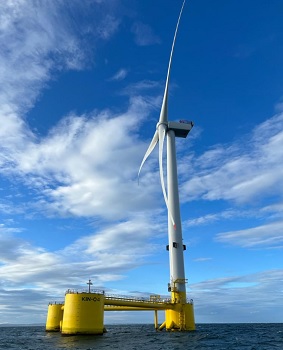
Kotek calls for pause on offshore wind turbines
Gov. Tina Kotek is joining a chorus of voices, including tribes and commercial fishermen, urging the Biden administration to slow down its push for floating wind farms in the Pacific Ocean off the state’s southern coast. Regulators are now preparing a draft report outlining where in the areas turbines may be built safely while minimizing harm to fisheries and marine life. Members of the West Coast fishing industry, however, claim that the bureau is ignoring their concerns. They worry that floating offshore wind farms will displace boats from highly productive fishing grounds and could irreversibly damage the California Current ecosystem. >click to read< 09:20

Maine Delegation, Gov. Mills asks BOEM to listen to fishermen, remove LMA1 from wind power planning

Contrary to mainstream belief, wind turbines are neither effective nor, in many cases, good for the environment
Claims of wind power being pro-environment often do not consider the damaging effects these projects can have on wildlife and ecosystems, thus hiding the “true cost” of such initiatives. Wind power projects can threaten birds that fly within their vicinity and trigger a decline in their population; it can harm marine life due to noise pollution and affect the growth of plants in the region where it is located. Driven by subsidies granted by the federal government, the growth of wind projects has triggered concerns about the cumulative impacts they have on the environment. There have been growing protests against wind power projects across the world. In the United States, people have opposed setting up wind turbines in Lake Erie due to concerns about the environmental impact of the project. In New Jersey, protestors have asked to pause the development of an offshore wind farm which they claim has led to dolphins and whales washing ashore. >click to read< 12:38
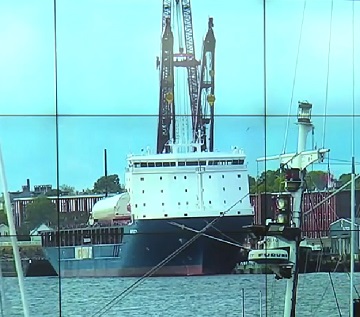
Ship carrying parts for offshore wind turbines arrives in New Bedford
New Bedford was once the city that lit the world, exporting vast quantities of whale oil for lamps in the early 1800s. Workers packed the docks, unloading casks of oil that had been extracted at sea from whale carcasses and brought in by a fleet of hundreds of whaling ships. Nearly two centuries later New Bedford aspires to light the world again, in a different relationship with the sea, as the offshore wind industry arrives here. On Wednesday, the vessel UHL Felicity bringing wind turbine tower sections from Portugal reached the Port of New Bedford. Once assembled out on the water this summer by developer Vineyard Wind, the turbines will stand more than 850 feet high. “There’s this sort of poetic coming-about for New Bedford as a center of energy,” Mayor Jon Mitchell said. Video, >click to read< 09:42
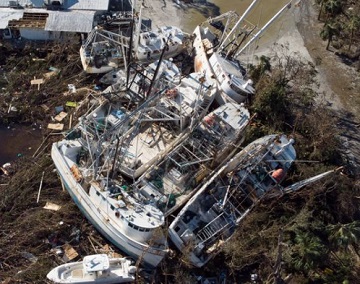
Commercial fishermen furious NOAA rejected DeSantis’ fishery disaster request
Are bad policies and poorly written federal statutes to blame? Or does it boil down to politics? That depends on who you ask. But, commercial fishermen across the state are sounding the alarm about the future of the commercial fishing industry and whether seafood that comes fresh from Florida can survive. “This industry is really on the verge of being gone,” Casey Streeter said. “We are out on our own, and there is no one coming to help us,” Streeter said. “And with this denial that we just received, you know, I don’t want to call it a death sentence to our progress and move forward, but I mean, it sets us back in a way that’s going to be pretty hard to overcome, for my particular situation, and the other fishermen in the area. >click to read< 08:50
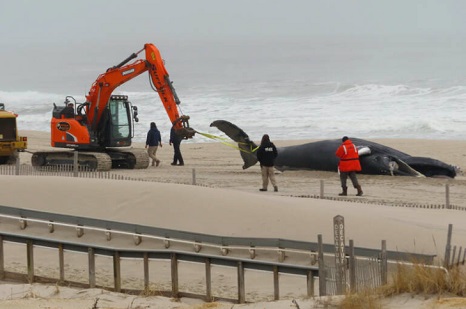
N.J. GOP seeks wind projects halt to see if whales benefit
Four state senators hosted a online hearing about offshore wind energy generation and whale deaths, three weeks after the most recent East Coast whale death was reported and despite the assurances of most scientists and conservationists that there is no correlation. The two-hour hearing came a week after Democrats, who control the Legislature and the governorship, held a similar hearing and many of New Jersey’s major environmental groups said the greatest danger to whales is climate change, not offshore wind generation. “I’ve been labeled a climate change denier and a tin-foil hat wearer,” said Jim Hutchinson, managing editor of The Fisherman,,, U.S. Rep. Frank Pallone Jr., who represents part of the Jersey Shore and who led last week’s Democratic-led forum, said pausing offshore wind projects wouldn’t prevent whale deaths. >click to read< 08:05
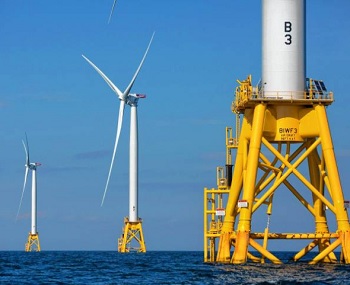
Proposed bill, Senate Bill 687, could stymy North Carolina’s offshore wind development
Offshore wind may have strong support in the White House and in the Governor’s Mansion in Raleigh, but it remains clear that support for the “green” power alternative to traditional fossil fuel power sources remains far from unanimous in North Carolina. Fishermen also have raised concerns about the wind farms placing rich fishing grounds out of bounds, and from some environmentalists worried about them negatively impacting marine life, especially the highly endangered North Atlantic right whale. Those lingering concerns have resurfaced in a proposed bill in Raleigh. Senate Bill 687, sponsored by Republican Sens. Tim Moffitt from Henderson County and Bobby Hanig from Currituck County, calls for a 10-year moratorium,,, >click to read< 09:49



































